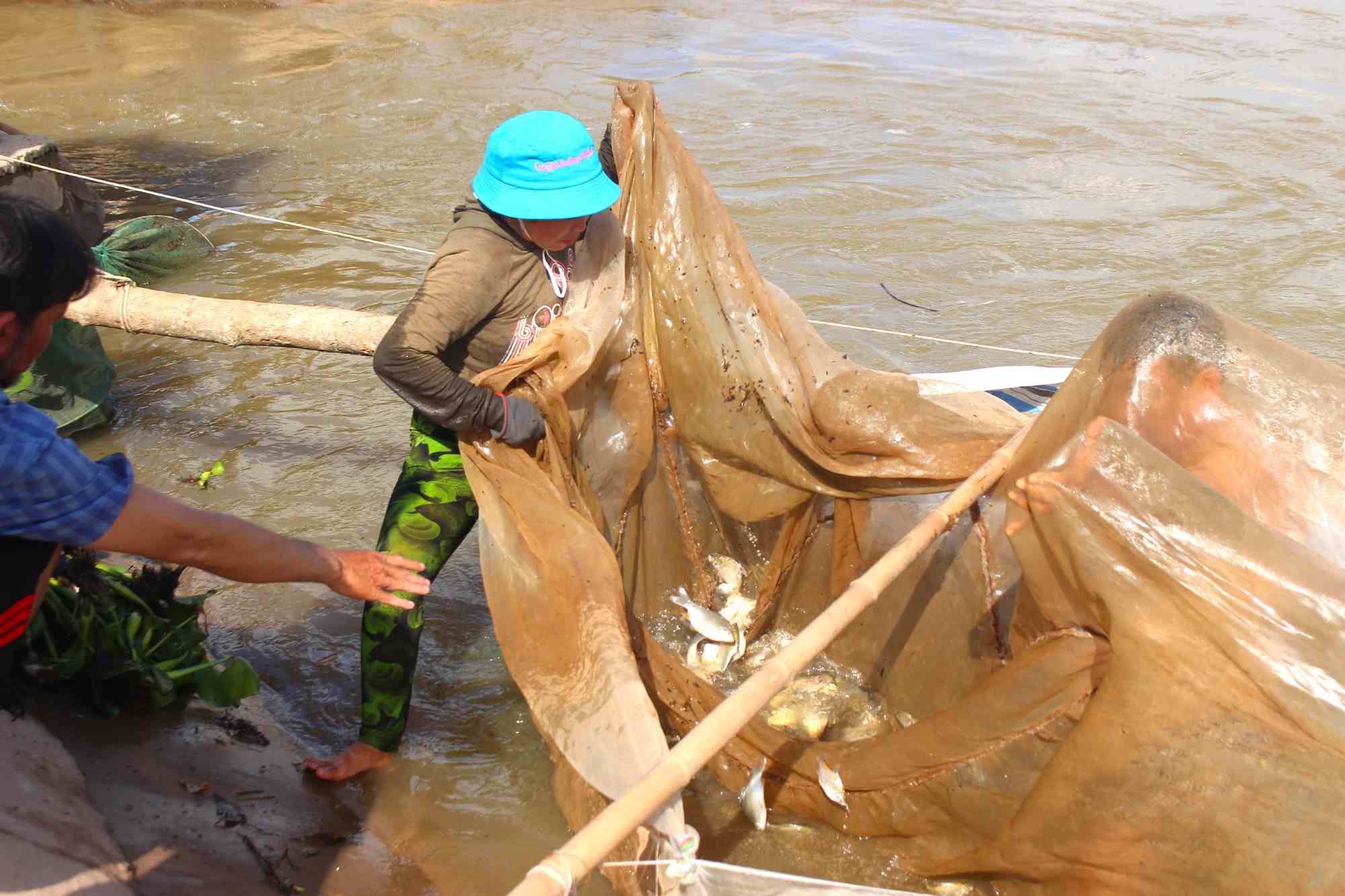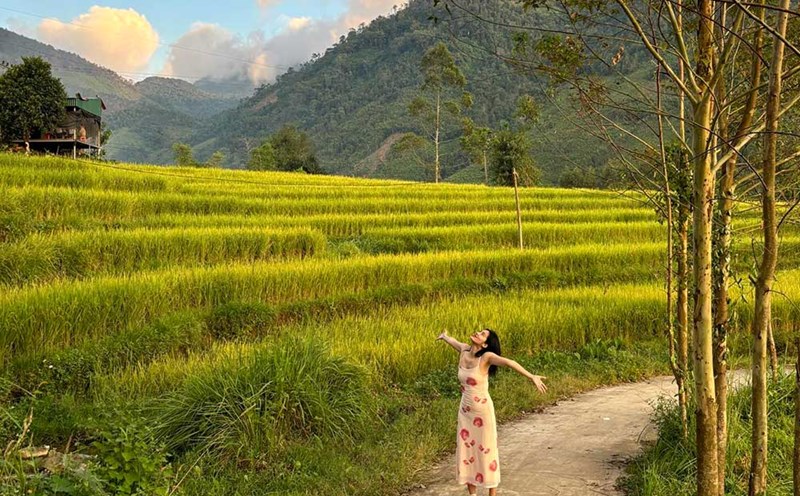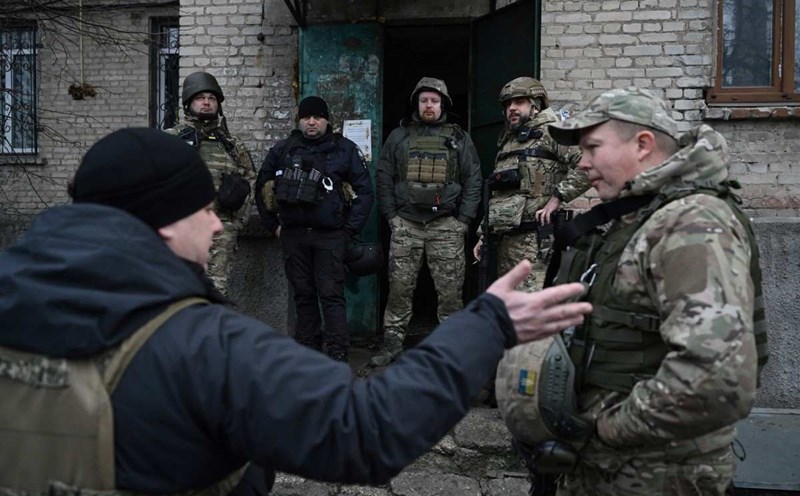No longer following the laws of nature
At the end of October 2024, drifting on a boat in the fields of Vinh Hau commune, An Phu district, An Giang province - the place that receives the first amount of water from the upper Mekong River flowing into Vietnam - we heard Mr. Nguyen Van Nuoc talk about fishing during the flood season as well as the situation of products this year, worrying about the ebb and flow of water.
The name Mr. Nuoc was given by his father as a memory of the prosperous period of the flood season, but this is now only a memory. Pointing to the field at the peak of the flood, Mr. Nuoc's voice was filled with emotion: "Before, when the flood came, this place was a sea of water, a warehouse of fish and shrimp, it was normal to catch a few dozen kilos of fish every day. But now it is no longer there."
Despite his best efforts, Mr. Nuoc can only harvest 2 - 3 kg of fish per day, and on top of that, they are usually small fish like linh fish, danh fish... with "cheap" prices.
Following the dike road in Vinh Hau commune for about 2km, we arrived at a larger-scale fishing spot - bottom fishing - a typical type of fishing in the Southern river region when water flows from the fields into the river. Mr. Nguyen Dinh Khuong (An Phu district) sadly said: "Now, bottom fishing only catches about 100kg per day. Knowing that the job is getting more and more difficult, but for people in the upstream area, it is like a career."

Transform to adapt
According to the assessment of the agricultural sector in the upstream provinces of the Mekong River such as An Giang and Dong Thap, not until the flood season of 2024, but in recent years, floods have been erratic and at low levels, leading to a decline in aquatic resources. Recognizing this situation, in recent years, many localities have made efforts to step up support for people to implement adaptive livelihood models to help increase income.
In An Giang, the model of "Fish farming cooperative in flood season" in Vinh Hau commune (An Phu district) stands out, implemented from the capital of the Mekong Delta Integrated Climate Resilience and Sustainable Livelihoods Project (WB9) invested by An Giang province and the Central Government in 3 communes on the east bank of the Hau River. Accordingly, the cooperative raises 4 fish cages and is expected to harvest 1 ton of catfish and 500kg of perch after 3 months.
“The cages are arranged on shallow ditches, so when the flood recedes, all the wild fish will be trapped. This is a significant source of additional income. After deducting expenses, we almost always make a profit and live well,” said Mr. Nguyen Chi Linh, Head of the Cooperative Group.
In 2023, after receiving training and a loan of 50 million VND, Mr. Duong Van Lam (born in 1973, Phu Hoi commune, An Phu district) also switched to crab farming on cages anchored along the Hau River branch passing through Phu Hoi commune's waters. At the end of the flood season, he released 1 ton and harvested 700kg of large-legged crabs to sell during Tet, earning over 100 million VND. This year, he added 1 more cage, estimating the total harvest during Tet will be 1.5 tons or more. "For many years, the price of crabs at the end of the year or after Tet has always been high, selling for 90,000 VND/kg" - Mr. Lam said.
According to Mr. Nguyen Tan Trieu - a fishery officer in charge of Phu Hoi commune - in addition to storing crabs, there are also many households storing linh fish, chot fish, and catfish in the area...
To see happiness on the flooded fields...
Mr. Phung The Vinh - Head of the Department of Agriculture and Rural Development of An Phu district - said that the locality is fortunate to have received investment from the province and the Central Government in the WB9 project. The project trains people in livelihoods, presents effective models, thereby equipping them with basic knowledge, so that people can proactively apply it to local conditions to develop the economy.
“The experience gained from implementing the project has motivated us to make more efforts in guiding people to change their livelihoods during the flood season in the coming time. Only then will people’s lives improve, and they will not have to wait for the flood but will take advantage of the flood water to develop the economy,” said Mr. Vinh.
After a journey following the fishermen in the upstream area to exploit and store aquatic products during the flood season, we found that thanks to the support of specialized agencies and the government, the people here have flexibly changed their thinking to adapt to the new context. These will be small sparks to ignite a movement to successfully implement Resolution No. 120/NQ-CP of the Government on sustainable development of the Mekong Delta, including production and adaptation to global climate change.











